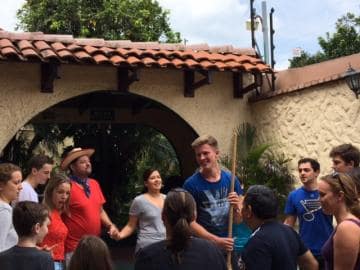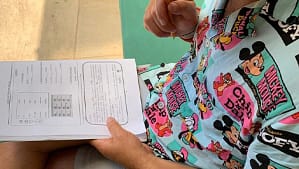
Immersion Essentials for Learning Spanish
Are you learning Spanish at home? Have you tried classes, but found yourself quickly speaking your native language outside of class? Are you ready for the next step in your Spanish Language experience? If you have answered yes to any of these questions, then we recommend take a leap and come to Costa Rica to put your skills to work. Relaxed people speaking at a slow, steady pace makes Costa Rica one of the world’s best places to learn Spanish.
The Perks of Immersing Yourself in Spanish
Immersing yourself in a Spanish speaking place forces you to use the language every day. The first things you’ll pick up are phrases that will help you eat and get around. Taxi instructions, polite questions, menu items and dietary specifications will become thrice daily necessities. But you’ll also quickly absorb phrases commonly spoken by locals. If your classroom didn’t teach you pura vida, mae or claro, well… we can give you a jump on that:
- Con Mucho Gusto (you are very welcome) which is said after any favor. Unlike other Spanish speaking Nations; Mexico o El Salvador where they say De Nada after a favor, Costa Ricans speak a very polite version of Spanish, seen not only with the mucho gusto, but also with use of Usted. Everyone from Grandmas to babies and even pets are referred to in the third personal singular, Usted.
- Pura Vida: (‘pure life’) if you haven’t already seen this in Costa Rica’s extensive tourism marketing campaigns, it’ll be the first thing you pick up. It can mean ‘thank you,’ ‘you’re welcome,’ ‘I’m doing well,’ or just ‘cool.’
- Claro: (‘clear’) Ticos use this like the English ‘clearly,’ although more often. It can substitute for any affirmative response, but it generally means something like ‘for sure,’ ‘no problem,’ ‘of course,’ or ‘yes, definitely!’
- Mae: (no direct translation) the Costa Rican equivalent of ‘dude.’ Claro, Mae! Pura vida!
These phrases are unavoidable when you’re immersed, but you won’t get that kind of conversational banter from formal lessons. That’s why immersion is still the technique preferred by Spanish translation specialists around the world.
Manners
You’ll also be quick to pick up on manners. When you hear people calling each other muchacho or chica all the time, it’s safe to assume you can politely do so as well. But be careful with those casual, friendly phrases! Listen to how people address their elders by putting Don or Doña before their names. You might get a gentle correction if you address the elderly too casually.
Direct Word-Object Association
Immersive SLA cuts out the middleman. When you see a starfruit at the market, and the vendor calls it a carambola, you don’t need to go through the mental process of translating carambola to ‘star fruit.’ Instead, your mind automatically associates carambola with the yellow fruit in front of you. This means that you pick up the word carambola much faster.
Sometimes you might not even realize that something has another name in English! To the immersed learner, the Spanish word is the object name. A green thing with fins and a shell that swims in the ocean here? That’s a tortuga. ‘Sea turtles’ live in Florida.
The Biggest Perk of All
Even if our experiences were turned upside down and academic research condemned immersion as useless, it would still have one undeniable benefit: you get to go abroad! Immersive SLA takes you to foreign shores, introduces you to different people and flavors, and gets you out in the world. What more reason do you really need to learn your Spanish abroad?
So get out there, because there’s a whole Spanish speaking world happening every hour of every day. It’s colorful and rich and full of life, and all you have to do is dive in and start learning–really, truly learning. You’ll never call a tortuga a ‘sea turtle’ again!
Author Bio:
Sean Patrick Hopwood is a language polyglot and a language enthusiast. His goal in life is to bring world peace through education, tolerance and cultural awareness. He is also the President and Founder at Day Translations, Inc., a global translation company.



